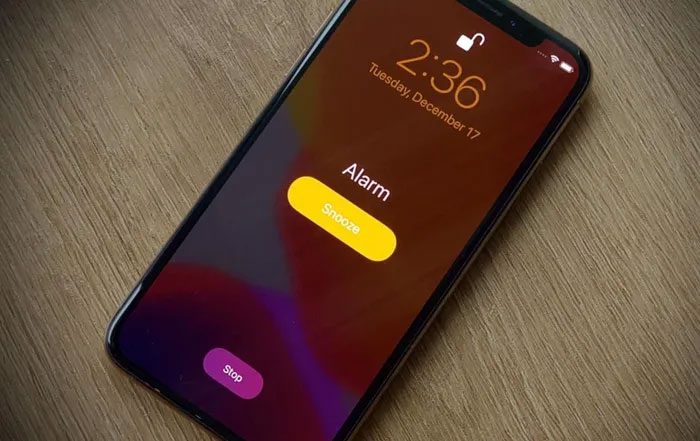Although there is no definitive conclusion yet, scientists believe that the human circadian clock may be related to this phenomenon.
Some individuals assert that they occasionally wake up 1-2 minutes earlier than their alarm clock. While there hasn’t been extensive research on this topic, Russell Foster, Director of the Sleep and Biological Rhythms Institute at the University of Oxford, claims that this seems to be “a real phenomenon” based on several pieces of evidence.

An illustration of an alarm clock placed on a bedside table. (Image: New York Times).
In a phone survey published in 1997 on PubMed, researchers in Iowa and Minnesota randomly interviewed 269 adults, most of whom were from the Midwestern United States.
The results revealed that about 3/4 of participants indicated that they sometimes wake up before the alarm rings. Meanwhile, less than 1/4 of respondents stated that their wake-up time is so consistent that they do not need an alarm clock.
After the interviews, the research team invited 15 volunteers to a sleep lab to monitor their sleep over three nights. In their daily lives, they regularly or always woke up at a specific time without using an alarm.
Before sleeping, the volunteers set a target wake-up time. The results showed that the actual wake-up times of 5 out of 15 participants differed by only about 10 minutes from their target over the three days.
According to the New York Times, it is still unclear why the body can achieve this. However, some scientists suggest that factors related to the human circadian clock are involved.
Dr. Ravi Allada, a neuroscientist specializing in sleep and biological rhythms at Northwestern University, states that the human circadian clock is regulated by a group of cells known as the suprachiasmatic nucleus (SCN), located above the optic nerve.
According to Foster, special cells in the eyes detect changes in light levels, such as just before dawn, even when our eyes are closed.
This allows various bodily changes to occur, such as increases in cortisol, adrenocorticotropic hormone, and blood pressure, preparing humans for different activities at various times of the day, for instance, sleeping at night and waking up when it is light.

Alarm interface on an iPhone. (Image: iOS Gadget Hacks).
Many people report that they can wake up much earlier than usual without an alarm, especially during important occasions like flights or meetings.
In these cases, Allada explains that instead of waking up based on the time of day, our bodies may wake up based on the duration of sleep, similar to how a sand timer works. For example, if we need to get up at 4 AM, our bodies recognize the need to wake up at that time.
This indicates that the body has a very good sense of time. However, we do not always wake up before the alarm, and some individuals never achieve this.
Currently, there is no precise answer to this phenomenon. However, according to Foster, the need for sleep may override the circadian clock when a person is excessively fatigued.
Many questions remain unanswered regarding how we wake ourselves at specific times. Nevertheless, Foster suggests that people can set their alarm clocks at a fixed time each day to help their bodies gradually adjust.


















































